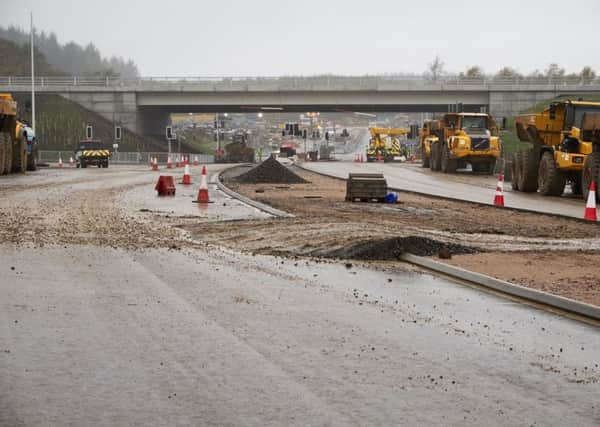Scottish Legal Review: Half full, or half empty?


In a document entitled “Delivering for Today, Investing for Tomorrow”, the government committed to exploring new investment models for infrastructure and increasing spending on the sector by 1 per cent of gross domestic product.
Though Ailsa Ritchie, infrastructure partner at CMS, says attracting the right contractors to build projects is essential and most prioritise projects that are in “stable regimes” and without “political risk associated with their delivery”.
Advertisement
Hide AdAdvertisement
Hide AdWhile she claims there is a lot going for Scotland in attracting international investors and contractors, she believes there are upcoming struggles. “Brexit is a challenge in terms of some contractors and we are hearing anecdotal evidence of some infrastructure funders who are saying they will close their books in early 2019 and wait to see what happens with Brexit,” she says.“Whether that is going to be true or not remains to be seen.”
Despite this she reports a steady year for CMS, having been involved in the £745 million Aberdeen Western Peripheral Route.
The firm has also been involved in Dumfries and Galloway Royal Infirmary, the region’s newest hospital, as well as numerous new schools up and down the country.
They come as part of the Scottish Government’s £1.8 billion Schools for the Future Programme to deliver 117 new schools in Scotland by 2020.
It was announced in June that 95 have so far been completed, bringing the number of new or refurbished schools in Scotland since 2007 to more than 750.
However, Lillian Mackenzie, projects partner at DLA Piper, also has concerns.
“Speaking generally, it has been quite a tough period for the industry,” she says. “We have seen a number of contractors exit the market over the last year or so.
“If you ask an average person if they think PPPs [public-private partnerships] are a good or a bad thing, they would probably say bad.
Advertisement
Hide AdAdvertisement
Hide Ad“However, if you asked the same person about their new school or hospital built under one of those initiatives, you would probably receive a very different response, so there are a number of different challenges in the industry.”
Her colleague Stuart McMillan, project finance partner at DLA Piper, agrees, adding: “We are quite lucky in Scotland in that we have always been at the forefront of engaging in infrastructure and finding new ways to fund and procure infrastructure from PPP to NPD [Non-Profit Distribution] and I am sure that process will keep going, but people will find new and better ways to procure projects.
“What we have is a very stable, well-recognised and well-regarded legal system in Scotland that is very helpful in attracting people into this country.”
Nicola Sturgeon announced in September that the Scottish Futures Trust is to examine Wales’ Mutual Investment Model – which Mackenzie says is like “asking the private sector partners to do their bit by way of community benefits” to promote education and training – to help secure investment for Scottish infrastructure projects and value for taxpayers.
She believes this shows a recognition that capital budgets are still constrained in Scotland and the rest of the UK.
But completion of the MIM examination will take some time, says Rod Munro, projects partner at MacRoberts, who has an optimistic view on the sector’s future.
“There is every reason to be positive,” he says. “You can understand the government’s role in driving investment so they are going to increase government demand for infrastructure investment.
“It is busy because there is always something going on, it never stops whatever the political or economic cycles are.”
Advertisement
Hide AdAdvertisement
Hide AdKey areas for the MacRoberts team in 2018 have been housing, energy, transport and health and education, and they are currently advising a bidder for the NESS Energy Project in Aberdeen.
It will process non-recyclable waste into energy from 2021, when the landfill ban comes into force in Scotland.
With the addition of digital and IT infrastructure, these are key areas for 2019, according to Munro.
He says: “Digital will no doubt have more money put into it. That may be in a more national basis but the City Region Deals will help with that.
“Everyone knows that Edinburgh, for example, is going to be a technology hub and no doubt its importance in that regard will increase in the coming years.”
A 2017 report by Stack Overflow, which monitors the movements of developers and their employers, found the city was the fastest- growing tech hub in the UK.
That should continue as Scotland’s first artificial intelligence accelerator will be launched there as a result of the Edinburgh and South-East Scotland City Region Deal.
And, as technological advances continue, the work for lawyers will change.
Advertisement
Hide AdAdvertisement
Hide AdCMS’s Ritchie says: “We have to think about new investment classes, for example, there is a lot of press coverage around electric vehicles.”
Her team are involved in discussions around smart cities which could see infrastructure planning integrate with digital.
“It is really considering where the consumer’s behaviour is going to change, where we want our infrastructure to be delivered and what it needs to be able to respond to permanent consumer demand,” she adds.
“But I think we will see a greater move to digital involvement in infrastructure, particularly around the transport brief.”
All four agree that Scotland’s reputation will ensure a strong pipeline of projects in the future.
McMillan adds: “Most of the funders such as the German and Japanese banks, increasingly insurers, are all familiar with our market and have worked in our market before.
“We have a great understanding of infrastructure and how these deals work and we have a very stable planning and legal system.
“In that regard we are a pretty safe bet in that if you invest in a project in Scotland you will have a product that works.”
This article appeared in the Scottish Legal Review 2018. A digital version can be found here.